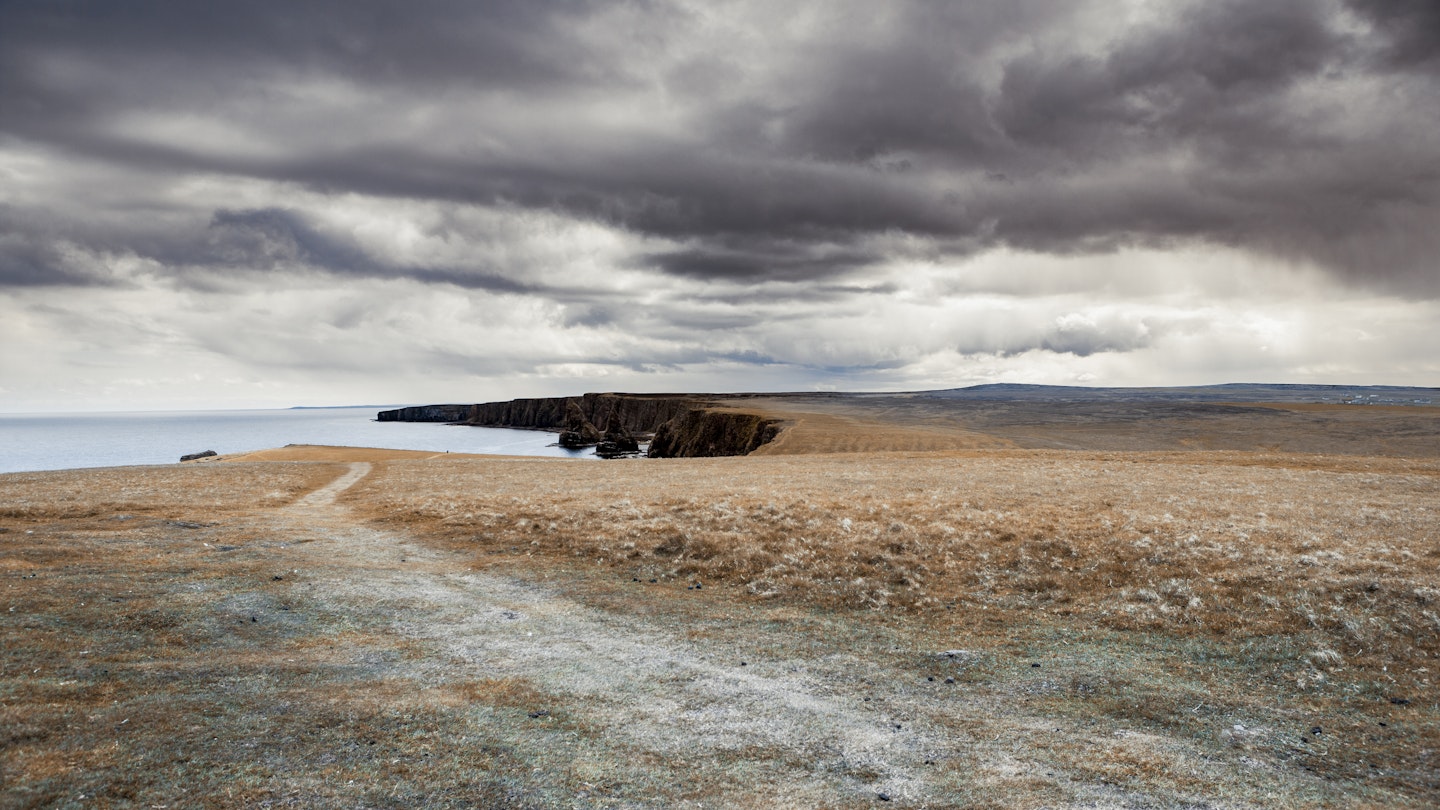iBestTravel
- Travel Stories
- Scotland
- Central Highlands
Share
Apr 17, 2020 • 9 min read

Exploring our catalogue of exceptional travel writing, we delve deep into narratives that illuminate both grand and intimate journeys.
This piece narrates how a detour in Scotland redirected the traveler’s path, originally penned by Fran Palumbo.
The scenery around me reflects my emotional state: grey, drizzly, and melancholic. Surprisingly, despite the persistent rainfall since my arrival a week ago, I find it challenging to dislike this place.
Light mist envelops the austere, rolling landscape, creating a soft, delicate appearance that resembles a giant pastel canvas. The sun occasionally breaks through the clouds, illuminating distant hills or crumbling stone walls, as if heralding the entrance to a mythical Camelot. As I zoom northeast on Route A9 from Inverness to Wick, I deftly shift gears in the red subcompact rental car, maneuvering as if I have been driving on the left side of the road my entire life. What better place to seek refuge from the world than the Scottish Highlands?
After an intense three months spent in India, I opted for an impromptu detour to Scotland on my return journey to San Francisco. My mind was still reeling from the overwhelming heat, poverty, and crowds of my recent past. Physically, I was still recovering from a parasite that decided to make my body its host. Additionally, a painful fallout with my best friend, who had accused me of ingratitude during my stay in India, left me feeling depleted. Not to mention, my heart was still bruised from a failed romance that had imploded before I ventured into Asia. I was at a breaking point; my need for solitude had never felt more pressing.
As I cruise through the quaint coastal towns of Dornoch, Brora, and Dunbeath, I make it a point to stop and snap quick photos or visit marked castle ruins, represented by tiny red stars on my map. Each red star signifies a place I feel compelled to visit, which distracts me from the persistent chatter in my mind. However, my stomach’s complaints are harder to ignore; they announce themselves rather loudly. Clearly, I need to eat.
After a long day of driving, I plan to stop in Wick, a town that appears to be the largest nearby, as suggested by the bold font on my map. Upon arrival, however, the town reveals itself to be rather dreary, with only a few historic stone buildings and a couple of unimpressive three-star hotels. I decide to bypass it, longing for a substantial meal and comfortable accommodation.
Continuing north, the road becomes less frequented, ultimately leading to Duncansby Head, the northeasternmost point of the Scottish mainland, where the humble harbor village of John o’Groats rests. This windswept area is characterized by its emptiness—vast stretches of land, sky, and water, all swept by a brisk sea breeze. During the summer months, ferries to the Orkney Islands depart from here, but aside from that, it hardly merits a mark on the map. With no charming bed and breakfasts or vibrant town center, only two rectangular, vintage-style motels sit in proximity, each about half a kilometer from the water where a few boats moor meekly. To the right, a caravan park stands awkwardly with several large vehicles parked haphazardly like some bizarre modern monoliths. To my dismay, a restaurant is nowhere to be found. It feels like the loneliest place on earth.

Gazing at my map, I see that the next town is quite distant. The typeface is too small, and I wonder if it will even have a place to stay. Reluctantly, I check into the Seaview Motel, dropping my suitcase onto the floor. The tiny window overlooks the deserted road, with a lumpy double bed adorned with a gaudy pink, green, and white chenille bedspread occupying the center of the room. A faded print of a cherub with a fishing pole hangs awkwardly above the bed. John o’Groats is not the picturesque haven I had envisioned for a cozy dinner and restful night.
Directed by the motel clerk to a nearby establishment that might still be serving dinner, I climb back into the car, weary and hoping the rain holds back a little longer. Peeking through the dense clouds, the sun glows defiantly, descending toward the horizon in a drawn-out manner. Being this far north, it won’t truly get dark until almost 11 p.m.
Arriving at a modest establishment that resembles a church from another era, I walk up to the counter to place my order. A blackboard menu features chalky letters announcing burgers, sandwiches, and soup. The ambiance is stark yet sincere, reminiscent of a Quaker meeting room; the scent and sizzle of fried food permeate the space. I order fish and chips, mentally promising to eat healthier the following day, and take a seat while the friendly husband-and-wife owners direct me to rearranged tables on the hardwood floor. The only other patron, a whimsical, elderly gentleman in loose trousers and a windbreaker, glances over at me and smiles shyly.
“Aye.” He nods in my direction, and I return the gesture.
“You’re not from around here, are ye?”
“No,” I admit. “I’m from California, just here travelling.” I hadn’t wanted to attract attention from the locals.
“So, are ye plannin’ to take the ferry to the Orkneys?”
“Well, no. I hadn’t really thought about it. I’m just driving; didn’t think there was much to see there.”
“Well, you ought to consider it. Last year, I was here and took the ferry over, and I spent the day there. It was lovely.”
He embarks on a guidebook-style narrative about birdwatching and ancient sites, particularly a place called the Ring of Brodgar. He provides directions, ferry schedules, and details on attractions. Although I have no intention of going, I feign interest and engage in conversation out of politeness. In truth, all I want is to enjoy my meal in peace without any interruptions. Yet, he is such a lovely, courteous man that I talk to him anyway; he appears to be lonely.

A generous platter of fish and chips arrives, and I cannot consume the crispy brown pieces fast enough. After a few moments, wishing not to interrupt my meal, the elderly gentleman rises from his table, shakes my hand with a warm smile, and expresses that he enjoyed our conversation.
As it grows late, I yearn to return to the motel, take a stroll by the water, and watch the sunset. Consequently, I quickly finish my meal and approach the counter to pay. To my surprise, the owner waves away my cash.
“It’s already paid for,” he informs me, leaving me perplexed.
“The old man took care of it when he left.”
Stunned by the generosity of a stranger, who chose to treat me without seeking recognition, I feel a wave of warmth. This is an act of kindness I have seldom encountered in my travels. After months of feeling as if each person I met wanted something from me, I finally meet someone who offers without expecting anything in return—not even a simple thank you. This small gesture is, ironically, larger than he can ever comprehend. As the urge to find the old man arises, I feel a compelling need to thank him, despite not even knowing his name.
Sure enough, a short distance ahead, I spot his silhouette ambling along with his hands tucked in his pockets. “Would you like a ride?” I offer, pulling up beside him. His face brightens into a wide smile as he eagerly accepts my invitation. He is petite and sprightly, with a curious, turned-up nose. For a fleeting moment, I humor the idea that perhaps I’ve encountered a leprechaun, quickly dismissing the thought knowing I’m in the wrong country. I drive him back to my motel, and we walk side by side towards the shores of Pentland Firth, the stretch of water separating the mainland from the Orkneys.
His name is Walter. He hails from Newcastle, a city just south of the Scottish border, and is currently staying at a caravan park. As if reading my thoughts, he states matter-of-factly, “My wife passed away a few years ago,” and I can see the wistfulness shadowing his face—a reflection of the lonely Highland landscape surrounding us. I fantasize fleetingly about how wonderful it would be if I were seventy, allowing Walter and me to explore Scotland in his mobile home together.
He gestures towards an old Victorian hotel hidden in the shadows near the coastline, its appearance ghastly. ‘It’s been shut for many years,’ he explains. Walter regularly visits John o’Groats, and as I observe my surroundings, I begin to understand his fondness for this place. The sun hangs low in the sky, as if attempting to delay its inevitable descent below the horizon. Broad, dramatic rays of light filter through fluffy clouds, providing a stunning backdrop to a solitary house slumbering on a desolate plain. The house embodies the loneliness I feel—isolated yet illuminated. Standing together, we seem an unlikely duo, yet we are drawn to the healing essence that emanates from these ancient waters.
Captivated, we watch as the sun gradually disappears into the edge of the world. Indeed, the most profound conversations can occur with strangers, even in silence. In this moment with Walter, my faith in humanity is rekindled.




